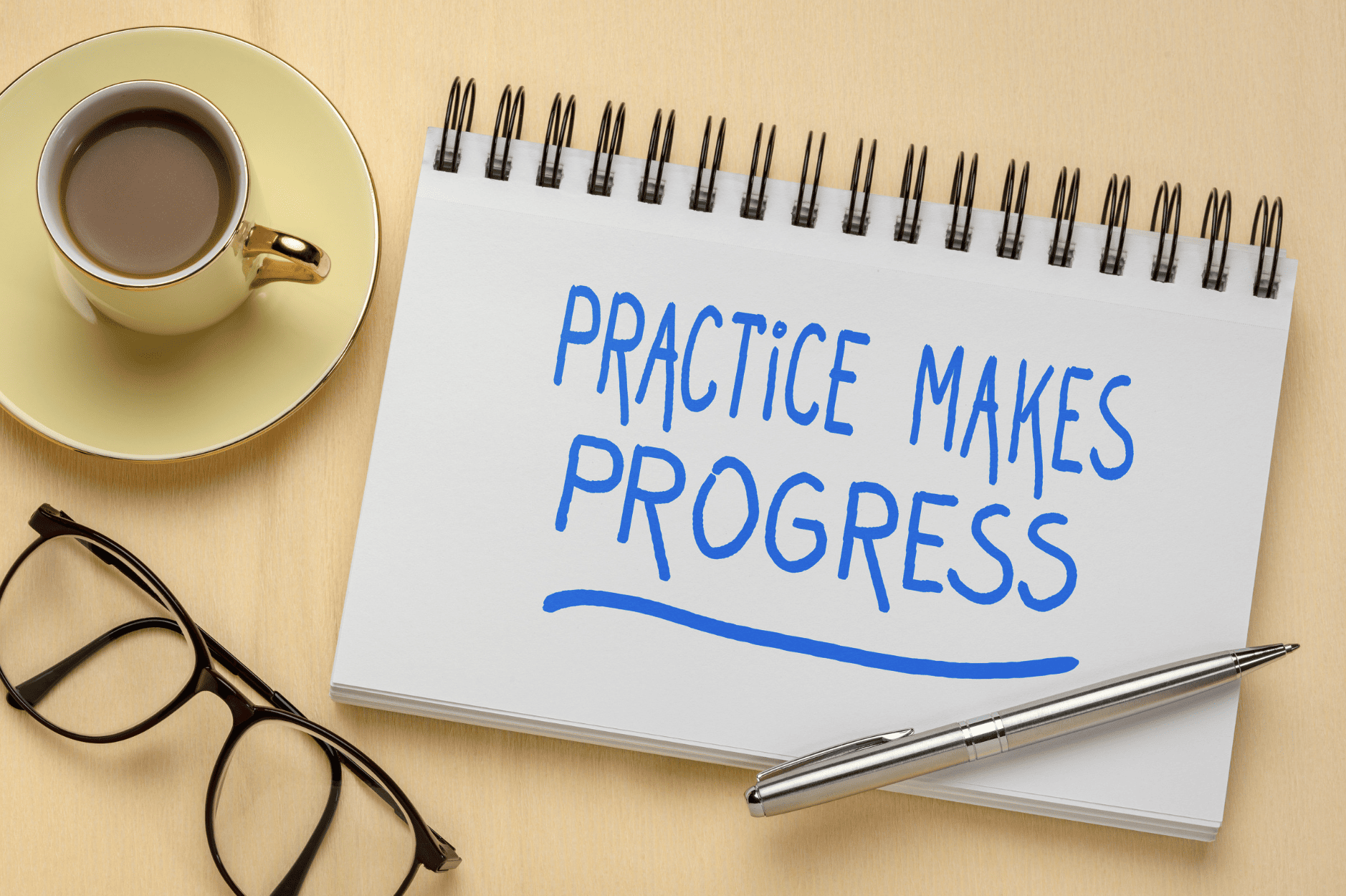Making Progress Through Purposeful Practice
We all want to get better at the things we care about. Whether it’s improving your golf swing, learning to play an instrument, or advancing your career, progress requires dedication and time.
There is no shortcut to mastery – by adopting the principles of purposeful practice, you can accelerate your learning and see noticeable improvements much faster. Let’s explore what purposeful practice is, why it’s so effective, and how you can apply it to make progress in any endeavor.
The Principles of Purposeful Practice
Purposeful practice is structured practice with the specific goal of improving performance. It requires focus, stepping outside your comfort zone, and receiving constant feedback. Purposeful practice is markedly different from simply putting in the reps without intention. Here are the key characteristics:
- Focused on a defined skill or technique to improve
- Conducted just beyond your current ability level
- Requires full concentration and effort
- Incorporates measurable feedback and adjustments
- Structured practice sessions with set goals
- Not inherently enjoyable, often feels difficult
For example, if you wanted to improve your free throws in basketball, purposeful practice would be repeatedly shooting from the free throw line while intentionally tweaking your technique between shots based on the feedback of your makes and misses.
The Benefits of Purposeful Practice
The great thing about purposeful practice is that it applies to any skill or discipline. By focusing your training, you can accelerate progress whether you’re learning a musical instrument, a sport, public speaking, coding, or even practicing new health habits for lasting change. Here are some of the benefits:
- Accelerates skill acquisition. Focused training builds competence faster.
- Develops muscle memory through repetition. Movement becomes automatic over time.
- Unlocks creativity by freeing up mental resources. Mastering fundamentals enables innovation.
- Builds confidence. Competence breeds confidence.
- Fosters an iterative mindset. You become comfortable with being uncomfortable as your skills improve, and you learn what works best for you in your practice.
The Science Behind Purposeful Practice
Decades of research on expertise development shows that purposeful practice is the key driver behind the mastery of skills and competitive advantage. Purposeful practice strengthens neural pathways in the brain associated with a particular skill through repetition and constant self-adjustment1.
Deliberate practice sessions with precise goals engage your full focus and concentration. As you repeat desired skills or movements, synaptic connections are made stronger. Receiving immediate feedback creates an opportunity to correct errors and engrain proper technique. Over time, skills become more automatic, requiring less conscious thought to execute.
Applying Purposeful Practice in Daily Life
You can leverage purposeful practice principles to improve any area of your life. The key is identifying a specific skill to improve that aligns with your goals. For example, if public speaking makes you nervous, you could practice delivering short speeches in front of a mirror, focusing on your posture, voice projection, and cadence.
Creating a structured practice plan allows you to maximize your training efficiency. Determine your exact goal, break skills down into sub-components, set aside regular practice sessions, and create drills or exercises that stretch your ability. Don’t rely on passive learning – active practice is required for progress.
You can also try incorporating purposeful practice into your existing routines. Maybe it’s practicing a musical instrument for 10 minutes in the morning or working on conversational skills during your commute. Little moments of focused practice add up over time.
Overcoming Challenges and Maintaining Motivation
Adopting purposeful practice often means overcoming inertia and staying disciplined. Here are some strategies to maintain motivation:
- Set measurable goals so you can track progress. Recording practice sessions helps sustain motivation.
- Join a class or find partners pursuing similar goals for communal accountability. Making commitments to others helps follow through.
- Focus on the process rather than results. Mastering fundamentals matters more than outcomes early on.
- Consider working with a coach or teacher. External feedback helps correct poor habits.
- Change up drills and routines to keep practice sessions fresh and engaging. Variety prevents boredom.
Remember that consistency over time matters far more than intensity. Even 10-15 minutes per day of purposeful practice leads to substantial improvements. Patience and persistence pay off.
Integrating Purposeful Practice with Fresh Tri
Tools like the Fresh Tri app provide the structure and accountability to turn purposeful practice from concept into reality. Features like habit tracking, goal setting, and progress visuals complement purposeful practice’s emphasis on measurement and consistency.
Creating pre-defined routines around your practice goals is essential. Fresh Tri’s customizable habit tracker allows you to schedule practice sessions and log completion. You can even join habit communities related to your interests for added motivation.
The combination of purposeful practice principles and habit formation tools leads to sustainable progress across all areas of life, from professional development to health and wellness.
Tips for Sustainable Progress
To maintain consistency, remember that small improvements compound:
- Start small. 10 minutes per day is better than 2 hours once a week.
- Focus on the process, not results. Mastery is a lifelong endeavor.
- Measure progress in terms of competence gained rather than external benchmarks.
- Expect plateaus – they are a normal part of the learning curve. Persist through them.
- Review your practice goals regularly and change programs to keep improving.
Purposefully Practice with Fresh Tri
Purposeful practice provides a framework for continuous improvement in any skill or discipline. By focusing your training, pushing past your comfort zone, and incorporating feedback, you can accelerate your learning and make meaningful progress. Fresh Tri gives you the tools to put purposeful practice principles into daily action.
Commit to active practice, not passive learning. Be patient with yourself, focus on fundamentals, and track small wins. Compound interest applies to personal growth, too! With consistent, purposeful practice over time, you can achieve your goals and become your best self. The journey requires patience and perseverance, but the rewards are immense. It’s time to level up your life through purposeful practice!
- Ericsson KA, Harwell KW. Deliberate Practice and Proposed Limits on the Effects of Practice on the Acquisition of Expert Performance: Why the Original Definition Matters and Recommendations for Future Research. Front Psychol. 2019 Oct 25;10:2396. doi: 10.3389/fpsyg.2019.02396. PMID: 31708836; PMCID: PMC6824411.













